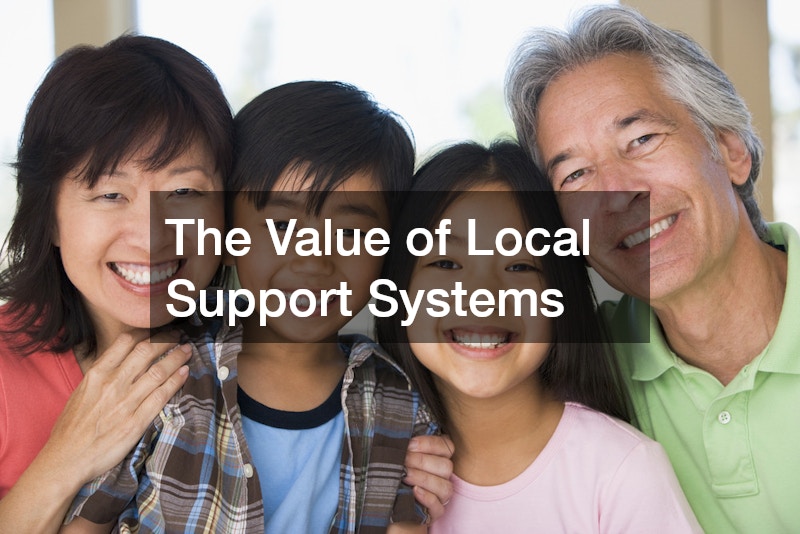Families evolve over time, experiencing seasons of growth, challenge, and transformation. From the excitement of welcoming new members to the stress of life transitions, every stage brings unique needs. While love and commitment form the foundation of a strong household, access to community-based resources can often determine whether families merely survive or truly thrive. Local support systems, ranging from educational programs to wellness services, play a vital role in building resilience and fostering stability. For growing families, these resources provide encouragement, tools, and guidance to handle both everyday responsibilities and unexpected hurdles.
This article explores the many ways local support strengthens families. By looking at emotional well-being, education, financial stability, community connections, and specialized services, we can better understand how families grow stronger when they have the right resources available.

The Value of Local Support Systems
Local support refers to the programs, services, and community organizations available within a town, city, or county that directly aid families. These can include nonprofit organizations, schools, healthcare providers, recreational facilities, and social service agencies. Together, they form a safety net that ensures no household has to manage life’s challenges completely on its own.
For growing families, access to these resources is often a game-changer. Parents may feel more confident knowing there are reliable services for childcare, tutoring, or counseling. Children benefit from positive environments outside of the home, where they can interact with peers and mentors. Local support also creates a sense of belonging; families feel integrated into their community, which fosters stability across generations.
When families can turn to nearby services for everything from food security to recreational opportunities, they develop stronger connections with each other and with the broader community.
Emotional and Mental Well-Being
Access to Counseling and Therapy
Emotional health is just as critical as physical well-being. Local counseling and therapy programs make professional support accessible to families that may not otherwise seek it out. Affordable services offered through community centers, nonprofits, or local clinics help parents and children work through stress, grief, or communication struggles.
For instance, a parent undergoing stress at work might find that regular therapy sessions provide the coping tools needed to keep harmony at home. Similarly, teenagers who experience anxiety or depression can benefit from youth counseling programs. These services often act as lifelines for growing families who want to nurture open communication and mutual support.

Support Groups and Peer Networks
Beyond professional counseling, peer support groups offer unique opportunities for connection. Parenting circles, grief groups, and programs for new mothers are just a few examples. These groups remind families that they’re not alone in their struggles. Sharing stories and listening to others fosters resilience, while creating friendships that often last for years.
Support groups are particularly beneficial for families undergoing life transitions, such as relocation. Just as a moving company eases the physical stress of changing homes, support networks help manage the emotional adjustment of starting over in a new community.
Educational and Developmental Growth
Tutoring and After-School Programs
Education forms the backbone of family advancement. Local tutoring centers and after-school programs provide children with critical academic support and enrichment. These programs often operate within schools or community centers, offering homework help, STEM activities, arts, and mentorship.
For growing families, these opportunities mean children are not left behind academically, even if parents work long hours or face financial challenges. Students who take advantage of tutoring not only improve grades but also develop greater confidence and motivation.

Parenting Workshops and Classes
Raising children doesn’t come with a manual, which is why many communities offer parenting workshops. These sessions teach strategies for effective communication, discipline, and child development. They also provide guidance on modern challenges such as screen time management or bullying.
Workshops help growing families create healthier household dynamics, reducing stress and encouraging unity. Parents leave with actionable skills they can use immediately, while children benefit from the improved environment.
Financial and Practical Stability
Job Training and Employment Assistance
Financial stability is one of the greatest predictors of family well-being. Local job training programs, resume workshops, and employment assistance services empower parents to pursue stable and fulfilling careers. These programs often partner with local businesses, ensuring that participants are connected to real opportunities.
For growing families, steady employment translates into less stress, better access to healthcare, and more consistent housing. Families with secure incomes can invest in experiences such as extracurricular activities, vacations, or even home upgrades like frameless shower doors, which elevate comfort and functionality in daily life.

Housing and Food Assistance Programs
Housing and food insecurity place an immense strain on families. Local support services such as food banks, housing initiatives, and rental assistance programs alleviate these burdens. When parents no longer worry about providing meals or a safe shelter, they can focus on nurturing relationships and supporting their children’s education.
The ripple effect of these services is profound. For example, children who have access to reliable nutrition are better able to concentrate in school, while parents can devote more attention to creating meaningful family connections.
Strengthening Community Connections
Recreational and Cultural Programs
Recreational programs such as youth sports leagues, dance classes, and cultural festivals help families connect with their community. These activities promote physical health, encourage teamwork, and introduce children to diverse experiences.
For growing families, participating in cultural events—whether it’s a community fair or a local performance—provides joy and shared memories. Just as a floral arrangement adds beauty to a celebration, community programs enrich the tapestry of family life.
Volunteer Opportunities for Families
Giving back is another powerful way families strengthen their bonds. Volunteer opportunities allow parents and children to work side by side, teaching values such as empathy, generosity, and social responsibility.
Community clean-up days, food drives, and charity walks create meaningful experiences for growing families. Volunteering not only improves the community but also reinforces the idea that families can be agents of positive change.
Support for Special Circumstances
Life often presents challenges that require specialized support. Families with elderly members may need caregiver assistance or adult day care services. Those raising children with special needs benefit from tailored educational and therapeutic programs.
Crisis services are equally critical. Emergency shelters and domestic violence resources provide safe havens for those in immediate danger. Access to these programs can make the difference between vulnerability and security for growing families.
In some cases, families face unique health or lifestyle needs. For example, when someone requires a chiropractic adjustment, affordable local clinics ensure that treatment is accessible. Similarly, if a household pet falls ill, the availability of an emergency vet can mean lifesaving care during a crisis. Each of these services demonstrates how comprehensive support networks contribute to family stability.
The Practical Side of Family Support
Local resources extend beyond traditional social services. Many practical services, while not directly labeled as “family programs,” nonetheless play a huge role in keeping households running smoothly.
For example, regular septic pumping ensures that a home’s plumbing functions reliably, sparing families from unexpected disruptions. Similarly, local AC repair companies keep homes comfortable during sweltering summers, which is essential for children and older relatives alike.
Other services support safe and enjoyable living environments. Tree removal services prevent hazards during storms, while swimming pool tile cleaning helps families maintain fun spaces for recreation. Even home improvements like driveway paving services add convenience and safety to daily routines. Each of these practical supports indirectly contributes to the overall well-being of growing families.
The Long-Term Benefits of Local Support
Access to strong support systems produces lasting benefits. Families who engage with local resources often report improved resilience during difficult times. Children raised in supportive communities demonstrate better academic performance and social skills. Parents feel less isolated, knowing they have a network to lean on.
These benefits compound over time. For growing families, the consistent presence of reliable support means they can face future challenges with confidence. From mental health to financial security, families that engage with community resources create foundations that endure for generations.
Moreover, local support strengthens not only individual families but the entire community. When households are stable, neighborhoods flourish, creating a cycle of growth and prosperity.
Health and Wellness Programs for Families
Good health is a cornerstone of family strength. Communities that offer wellness programs, such as fitness classes, nutrition workshops, or preventive screenings, give families the tools to live healthier lives. Parents learn practical strategies for meal planning and exercise, while children develop habits that can last a lifetime.
For growing families, having access to affordable wellness programs reduces the risk of chronic illness and teaches everyone the value of maintaining balance. Whether it’s joining a weekend yoga class or participating in a health fair, these opportunities create moments of bonding while supporting overall well-being.
Childcare and Early Learning Support
Reliable childcare is one of the most essential needs for households with young children. Local daycare centers, preschools, and early learning programs provide safe environments where children can thrive socially and academically.
Access to high-quality childcare allows parents to pursue careers, attend school, or focus on personal goals with peace of mind. Just as frameless shower doors bring clarity and openness into a home, early learning programs create clear pathways for children’s development. These resources are particularly vital for growing families balancing the demands of work and parenting.
Housing and Home Improvement Resources
Safe and secure housing is at the heart of family stability. Communities that offer housing counseling, rental assistance, or first-time homebuyer programs empower families to build a strong foundation. Some areas even provide workshops on home maintenance or partner with nonprofits to support renovations.
Home improvements also play a role in family well-being. Services such as driveway paving services or swimming pool tile cleaning may seem small, but they contribute to a safe, functional, and enjoyable home environment. For growing families, these practical upgrades reduce stress and allow more energy to be devoted to spending time together.
Environmental and Outdoor Programs
Access to nature is an often-overlooked form of support. Parks, community gardens, and outdoor programs encourage families to spend time together in healthy and restorative ways. Gardening projects, hiking trails, and conservation events all promote active lifestyles while fostering appreciation for the environment.
Outdoor programs are especially beneficial for children, who gain opportunities for exploration and teamwork. Just as tree removal services keep neighborhoods safe, outdoor initiatives create welcoming spaces where growing families can gather, relax, and thrive.
Emergency and Crisis Support
Life is unpredictable, and families often face emergencies that require immediate help. Local crisis hotlines, shelters, and disaster relief organizations provide urgent assistance when it’s needed most. These services can include everything from temporary housing to mental health intervention.
For instance, if a pet suddenly falls ill, access to an emergency vet ensures quick treatment and peace of mind. Likewise, families impacted by natural disasters or sudden financial hardship rely on local resources to regain stability. For growing families, knowing that crisis support is available can reduce fear and strengthen resilience in the face of adversity.
Technology and Digital Support Programs
Modern families rely heavily on technology for education, work, and communication. Local libraries, community centers, and nonprofit organizations often offer digital literacy classes, free internet access, and workshops on safe online practices.
These programs are invaluable for growing families, ensuring that children can complete schoolwork, parents can apply for jobs, and seniors can stay connected. Just as a chiropractic adjustment realigns the body for better function, digital literacy resources realign opportunities for families in today’s world.
Families are dynamic, constantly adapting to life’s changes. While love and dedication provide the heart of a household, local support systems serve as the framework that sustains them. From counseling services to practical resources like tree removal services or local AC repair companies, these programs and providers ensure that families don’t face challenges alone.
For growing families, access to community resources is transformative. It builds emotional resilience, enhances educational opportunities, stabilizes finances, and nurtures lasting connections. Families that take advantage of local support not only grow stronger within themselves but also contribute to healthier, more connected communities.
No matter the stage of life, reaching out for support is never a sign of weakness—it’s a step toward growth, stability, and strength. By exploring what’s available locally, families can unlock opportunities to thrive for years to come.


